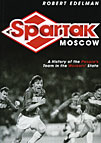 A History of the People's Team in the Workers' State
A History of the People's Team in the Workers' State
by Robert Edelman
Cornell University Press, £21.95
Reviewed by Jonathan Wilson
From WSC 278 April 2010
Listen to some fans of Spartak Moscow and they would have you believe that their club almost single-handedly defied the state machine, that the 12 league titles they won in Soviet times were each clear and decisive blows for liberty and independence. Spartak's founder and long-time president, Nikolai Starostin, is hailed as some sort of sporting saint, whose years in a prison camp in Siberia were a form of martyrdom for the spirit of freedom he kindled in others.
Much of the story, of course, is myth-making. There are few groups so prone to self-aggrandising invention as football fans and those looking to explain what happened in the murkiest days of the Soviet Union. So at its best Robert Edelman's book is a heroic attempt to sift through the legend and arrive at something approaching the truth.
Edelman admits in his conclusion that on meeting the 92-year-old Starostin in 1990, he was "more than a little starstruck… and my two hours with the great man did little to diminish my positive view". He goes on, though, to acknowledge "if I had known then what I know now… I would have asked a different set of far less comfortable questions." Starostin was probably the great patriarch of Soviet football and his club were, uniquely among the Russian giants, not allied to any state apparatus. Like anyone else, however, he made concessions to the regime, compromised his idealism and engaged in dubious practices to promote his club.
If, as the more blinkered Spartak fans claim, the state really did oppose him at every turn, how did he manage to access apartments in Moscow to offer as inducements to players? How did Spartak remain so successful? And if the Georgian head of the secret police, Lavrenty Beria, really was fixing games to the advantage of the side he supported, Dinamo Tbilisi, why did they win nothing until after his death? Although he never quite gets to the bottom of why Starostin and his brothers were jailed in 1941 – and you suspect nobody ever will – Edelman's achievement is, over the course of 306 densely researched pages, to present a nuanced portrait of him and the club. "If Starostin can no longer be seen as an unalloyed hero," he writes, "he does remain a very impressive figure with strengths and weaknesses."
Starostin and the club's relationship with the state provide the book's central tension, but just as fascinating are the descriptions of attending matches in 1930s Moscow. This is an academic book, which can leave descriptions of games feeling a little flat or clinical for the lay reader (and Edelman isn't helped in that regard by the US habit of seeing sport as a series of discrete events rather than an organic continuum). But in the tales of fans clinging to the back of trams and haggling for tickets, it really comes to life. It may not be particularly readable, but this is a great work of research on a great club.